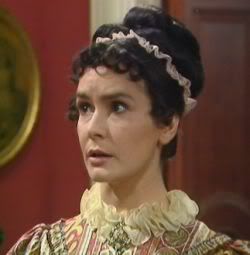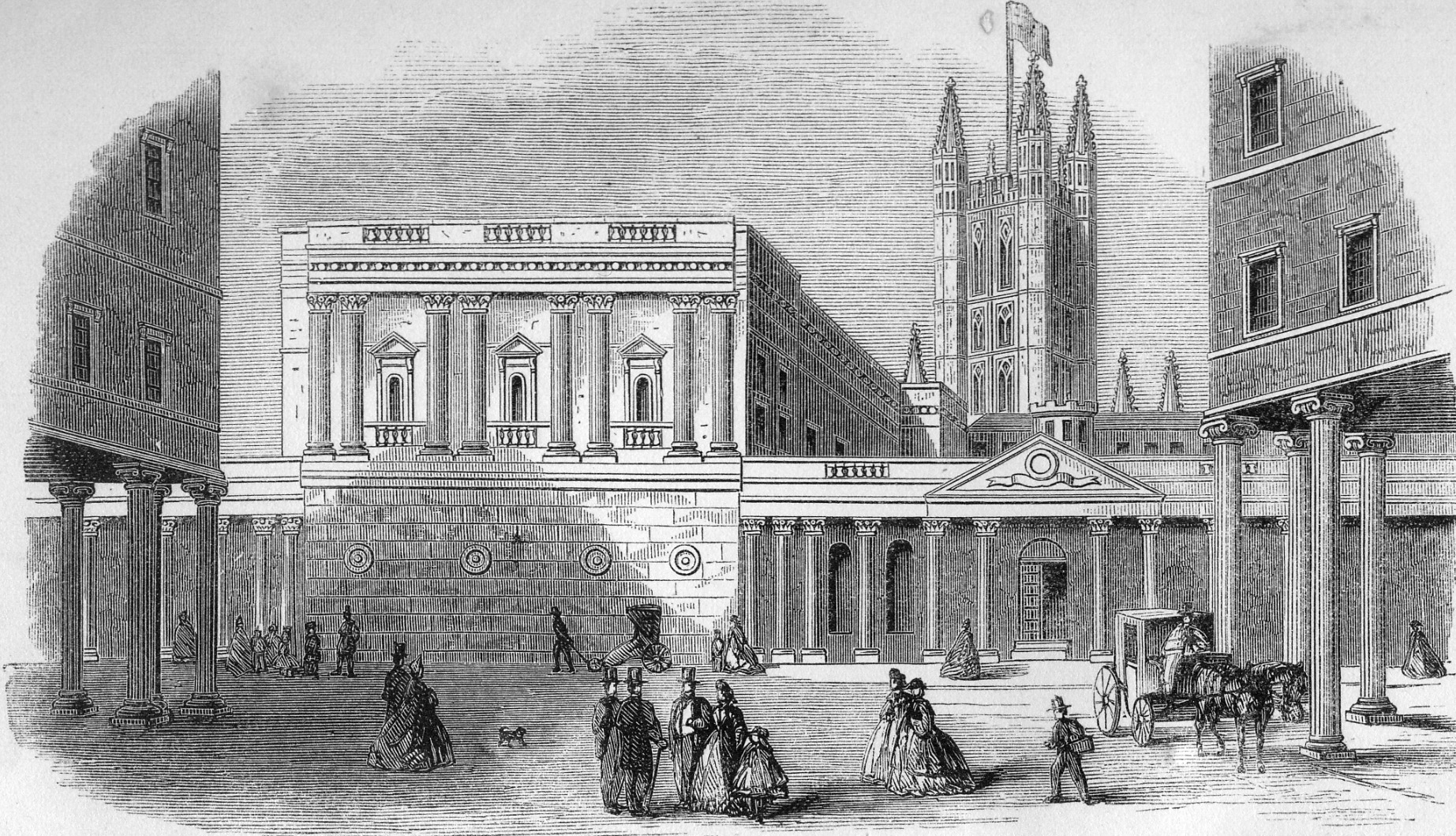What was that commission? I attempt to answer that question in Persuadable.
I decided to make the commission a book purchase (there were several bookstalls in Bath at the time, including on Union Street). My next decision was, What book?
The late eighteenth and early nineteenth centuries were awash in books--not as many as now-a-days, of course, but still an appreciable amount. And ever since Richardson's Pamela, books by, about, and for women had become extremely popular. In selecting what type of book would interest Penelope Clay, I was faced with an autobiography by the wife of an American diplomat, multiple books about women in distress, not to mention Austen's Horrid Novels.
| Not the cover from Austen's | |
| day, of course, but effectively | |
| captures the essence of the book. |
Consequently, I always chuckle when I hear claims that once-upon-a-time, life was so good and pure--you know, back in Jane Austen's day when people had tea on the lawn and didn't kiss until they were married.
The eighteenth and nineteenth centuries were as full of porn, erotic novels, sexual scandals, and salacious news about such, as our time. The counterargument is, But nowadays, all that stuff is so much more prevalent, to which I must point out that one constant of human nature is the ability to spread gossip quicker than a person can say, "Oooh, really? Tell me more!"
Consider that one of the most infamous cases of the mid-eighteenth century was Elizabeth Canning. Elizabeth Canning disappeared from home for several days. When she reappeared, she claimed she had been kidnapped and held by a perverse woman who wanted to turn her into a prostitute. Her story was suspect (though not necessarily false), but Canning's supporters--Canningites (no kidding)--treated the case less as a matter for the court and more as a cause. They behaved rather like supporters of so-called recovered memory victims. And the case took on the same high emotional fervor as cases about Satanism in daycares.
In other words, everybody went nuts.
 | ||
| Elizabeth Canning on trial | ||
| for perjury. |
Josephine Tey used the Canning affair to write her book The Franchise Affair. The book is ardently anti-Canning, indicating that even so many years later, the story has the power to invite partisanship.
Or perhaps, it simply indicates that the human desire for SCANDAL, WACKY HAPPENINGS, SEX! will never change.
Will Elliot and Penelope Clay exchange their own thoughts about scandal and wacky happenings when he brings Penelope her book:
Will Elliot . . . dropped by Camden Place with [Penelope's] book. She received him in the sitting room; no one else was home, and the servants were typically unavailable. As soon as he entered, Will lounged into a chair and tossed over The Memoirs of Miss Sidney Bidulph.
“You have a taste for troubled heroines.”
“She reminds readers that marriage is a troubled state.”
“Isn’t she terribly selfless and forbearing? Are non-fictional women ever that self-effacing?”
“Oh, yes,” Penelope said and told him what [she had learned] about Anne and Captain Wentworth['s history].
“I thought there was a history there,” he said. “Pity for Miss Anne she didn’t accept. The man is worth thousands. But then, of course, she would feel a duty to her family, her name, etcetera.”
“In this case, it was more a duty to her friend. Lady Russell was the deciding factor.”
“She probably stands in loco parentis to Anne. Young girls are supposed to avoid calamity by listening to their mothers.”
Penelope hadn’t considered that aspect of the relationship: she so rarely felt like a mother herself—or like her mother’s child. She nodded dubiously, trying to comprehend a state of affairs where she would sacrifice her own objectives at someone’s suggestion, no matter how well-meant that suggestion.
“Although I’m surprised Lady Russell objected,” Will said. “The man isn’t that far down the social ladder.”
“Lady Russell thinks Anne deserves a duke or a prince. Someone of tremendous worth anyway.”
“Like me?!” Will exclaimed in mock astonishment.
“You have the family name.”
“Of no remarkable history.” Will tipped back in his chair.
They sat in companionable contemplation of the unexceptional Elliot name.
“You are currently slated to inherit Kellynch Hall,” Penelope pointed out.
“And naturally Lady Russell would like to see her protégé ensconced there, emulating Lady Bountiful to the obsequious villagers.”
“Anne would probably do it very well.” Penelope gave him a curious sideways glance. “You don’t have a high opinion of this baronetcy that you claim to want.”
“One should never sneer at the prospect of obsequious villagers or the possibility of more money. Besides, I need a change in lifestyle.”
“Country-life would bore you.”
“Is that why you’re threatening to give Sir Walter an heir—to keep my life interesting?”
Penelope just smiled. Will had a far more optimistic opinion of Sir Walter’s prowess than she. Penelope had no desire to produce more children in any case. She would rather Sir Walter funded her living sons’ educations than try to create fantastical ones.
She could assure Will of her disinterest in a legacy. She could tell him that she only wanted to be the wife of a baronet, not the mother of one. But he would not believe her. He would point out that Sir Walter might insist on his conjugal rights and Penelope had proven she could produce male children.
He said, “I suppose I’ll have to pursue Miss Anne more vigorously.”
“I don’t think you could achieve her now.”
“Oh?” Will’s chair tipped forward, so his laughing eyes met hers. “Are you so sure of Captain Wentworth’s ascendancy?”
“He’s a lover from her youth.”
“A spring-time lover. By autumn, young plants have grown and died. Or turned to mulch. New beds must be made.”
Penelope shook her head. “She would have married already if she didn’t still love him. Anne is the marrying kind. She is competent and sympathetic and spends her time servicing her family’s needs.”
“Not like you.”
“No.”
Penelope’s parents would look after her sons no matter what happened to her. No one would look out for Penelope but Penelope.
Will was leaning forward now, eyeing her over clasped hands.
“I do need to consider my future,” he said. “I should pursue this paragon for myself.”
“You’ll have a chance at the concert tonight,” Penelope said and stood. “Thank you for delivering my book.”
Upstairs in her tiny room, she tried to forget Will’s speculative gaze. She needed to focus on Sir Walter. Will Elliot had proved an amusing distraction, but she had to stop eliciting his attention, provoking him to spurts of laughter, trying to impress him with her insights.
I’m as bad as Sir Walter, enamored by a charming man. Only Anne seemed to have guessed Will’s true nature and held herself aloof. Let him try to win her. Let him marry her. It won’t be love. Penelope didn’t think Will Elliot could genuinely love anyone. She was not such a fool to test the possibility.

















